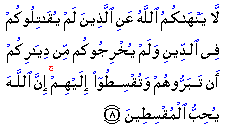Al-Mumtahana (The Tested Woman)
Chapter 60: Verse 8
 Mutual Respect Mutual Respect
"Allah forbids you not, with regard to those who fight you not for (your) Faith nor drive you out of your homes, from dealing kindly and justly with them: for Allah loveth those who are just."
Prophet Muhammad, peace be upon him, had always retained very strong ties with the members of different clans and with his kin who had not accepted Islam. His uncle Abu Talib, who he loved so much and whom he accompanied until he breathed his last, was one such example. Another uncle, Abbas, remained by the Prophet's side even though he had not yet converted. Muhammad's trust in him was tremendous, and he did not hesitate to confide in him or have him take part in private meetings involving the future of the community. His remaining a polytheist never prevented the Prophet from showing him the greatest respect and deepest confidence in situations where his very life was at risk.
It was a similar attitude of trust that had made it possible for Muslims to emigrate to Abyssinia, under protection of a king whom the Prophet trusted even though he was not a Muslim. This attitude is to be found throughout the Prophet's life: he established his relationships in the name of trust and the respect of principles, and not exclusively on the basis of similar religious affiliations. His Companions had understood it as well, and they did not hesitate to develop solid ties with non-Muslims in the name of kinship or friendship, on the basis of mutual respect and trust, even in perilous situations. Thus, Um Salamah, who had been separated from her husband, found herself alone with her son on her way to Medina. Uthman ibn Talhah, who was not a Muslim, offered to escort and protect her until she reached the place where her husband was. Um Salamah was often to tell this story, always praising Uthman ibn Talhah's noble character.
Examples of this nature abound, and neither the Prophet nor the other Muslims ever restricted their social and human relations to their co-religionists. Later, the Quran was to establish the rightfulness and the principle of such relationships formed on the basis of mutual respect.
Source:
"In The Footsteps of the Prophet" - Tariq Ramadan, pp. 76,77 |
Daughters in Islam
If it was not for the commands of Allah, stated in the Quran, and the Sunnah of the Prophet (peace and blessings of Allah be upon him), women would not have been given the preference over men. Allah's Prophet was reported as saying: “Be fair and just in terms of the gifts you offer your children. If I was to give preference to any (gender over the other) I would have preferred females over males (in terms of gifts).” [Bayhaqi]
Moreover, Allah's Prophet concentrated throughout his teachings on giving more care and attention to females in general over the male. Females must be treated with kindness, respect, honor, dignity, integrity and their needs must be looked after. Allah's Prophet said: “He whosoever has three daughters, or three sisters, or two daughters or two sisters, and is very kind to them, demonstrating nice company to them and fears Allah in their treatment, will enter Paradise (as a result of his good actions to these females).” [Abu Dawood & Tirmidhi]
Islamic laws and teachings mandate that parents raise their children in the best manners and offer them a sound, beneficial and healthy education. Ibn Omar (may Allah be pleased with him), reported Allah's Prophet (peace and blessings of Allah be upon him) as saying: “The most sinful of you are those who neglect those whom he is responsible to take care of.” [Abu Dawood & Nasaiee]
Source:
"Women In the Shade of Islam" - Abdulrahman Al-Sheha, pp. 33, 34
|
Shafa'at
Root word Shafa'a: To make even that which was odd, make double, pair, make a thing to be one of the pair, adjoin a thing to its like, provide a thing which was alone with another, protect, mediate, intercede, be an intercessor. Shaf'un: Pair, Double.
Shafa'at: The word has the significance of likeness and similarity, also it means interceding or praying for a person that he may be shown favour. As he is connected with intercessor, it also implies that the petitioner or the intercessor is a person of higher position than the one for whom he pleads and also has deep connection with the person with whom he intercedes. The significance of Shafa'at is that it is an institution of a way which another imitates so that the latter joins himself to his model.
Thus Shafa'at has twofold significance, firstly it enables a person to walk in the ways of righteousness by imitating a model and secondly it affords him a shelter from the evil consequences of certain weaknesses which he is unable to overcome by himself and requires the prayer and support of an innocent person. The person in whose favour Shafa'at is sought must generally be a good person who has made an honest effort to win the pleasure of God (21:28), only he has fallen into sin, in a moment of weakness. Shafa'at can only be made with God's express permission (2:255; 10:3).
It is another form of repentance signifying reforming a broken connection or tightening up a loose one. So whereas the door of repentance becomes closed with death the door of Shafa'at remains open. Moreover Shafa'at is a means of the manifestation of God's mercy and He is not a judge or magistrate but Master. There is nothing to stop Him from extending His mercy to whomsoever He pleases.
The root with its different forms has been used in the Quran about 31 times.
Compiled
From:
"Dictionary of the Holy Quran" - Abdul Mannan Omar, pp. 293, 295
|